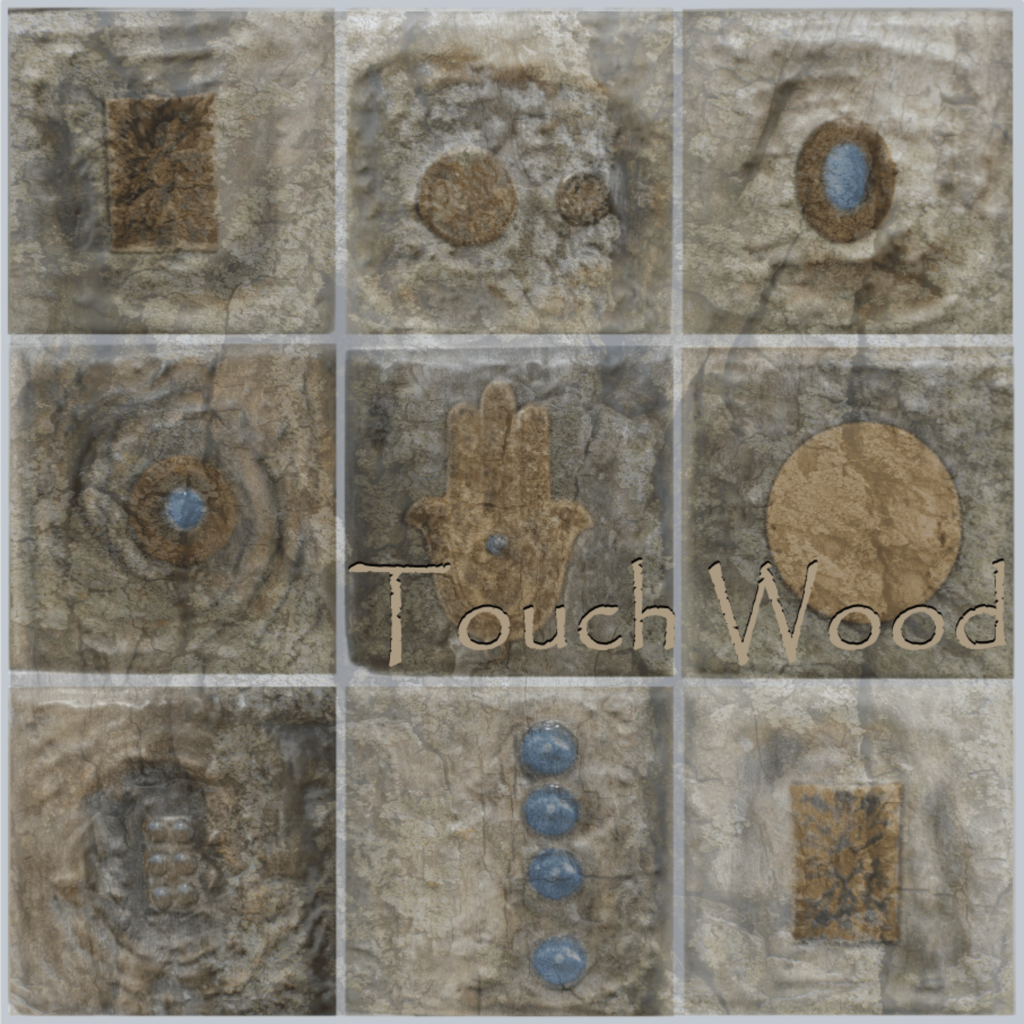David Powell and The Speekers – Touch Wood
David Powell’s latest offering, “Touch Wood,” presents a fascinating meditation on transformation, ancestry, and the liminal spaces between consciousness and dream. The English-born, Australian-raised, Qatar-based artist has crafted something genuinely unique here—a sonic journey that feels both deeply personal and universally resonant, enhanced by his ethereal collaborators, the text-to-speech ‘Speekers’ (Moira, Emma, and Vicki), whose ghostly harmonies add an otherworldly dimension to Powell’s philosophical explorations.
The album opens with its title track in intimate fashion, beginning with the gentle sounds of family life. This deeply personal touch suggests Powell has woven his domestic world into the sonic fabric. This opening immediately establishes the album’s themes of cautious optimism and synchronicity while grounding the philosophical in the personal. Powell’s lyrics suggest a worldview where meaning emerges from the intersection of dreams, memory, and myth—a concept that threads through the entire record. The phrase “before the miller and the smith came the story of today” hints at an archetypal understanding of human experience, suggesting that our contemporary struggles are merely new expressions of ancient patterns.
This ancestral thread becomes most explicit in “Cotton and Coal,” perhaps the album’s most emotionally resonant track. Here, Powell weaves together wedding imagery with industrial heritage, creating a powerful meditation on family lineage and working-class identity. The juxtaposition of “the mill and the mine” with “blood and bone, earth and divine” suggests that our industrial past isn’t separate from our spiritual nature—they’re inextricably linked elements of human experience. The song feels like a love letter to the generations who built the foundation for contemporary life through their labour and sacrifice.
The album’s emotional core lies in “Lovesong,” Powell’s slowed-down cover of The Cure’s wedding song. This choice feels deeply intentional—taking Robert Smith’s original wedding composition and reimagining it through Powell’s distinctive sonic lens creates a bridge between personal history and artistic expression. The tender lyrics about wholeness and belonging are transformed through Powell’s treatment, creating something that honours both the original’s romantic intent and his aesthetic vision. The cover’s placement here suggests that transformation doesn’t always require creating something entirely new; sometimes it means finding fresh meaning in existing forms. “(I Wanna Be) Your Melody” then serves as a natural musical progression from the opener, sharing similar sonic DNA while exploring themes of artistic connection and creative intimacy.
“Second Nature” serves as the album’s most confrontation with modern anxiety, built on a foundation of compelling percussion and a deceptively simple yet impressive bassline that drives the track forward. Here, Powell introduces additional voices—possibly family members, possibly samples—creating an intriguing ambiguity that could represent either option beautifully. The distinctive vocal treatments throughout the track feel both sampled and unmistakably human, a recurring sonic signature that Powell uses to great effect throughout the album. He catalogues the ways contemporary life shapes us—”Socialized, Hypnotized, Patronized”—before presenting the crucial choice between viewing our circumstances as “prison” or “prism.” This binary encapsulates much of the album’s philosophical tension: does conditioning trap us, or can we transform our limitations into tools for understanding?
“Soil and Soul” emerges as a pivotal meditation on the fundamental duality of human existence, exploring the tension between our earthbound nature and spiritual aspirations. Powell confronts the archetypal myths that shape our understanding of identity—birth, matter, and the concept of “fall”—while weaving in the distinctly Australian cultural reference of “tall poppy syndrome.” This insertion of cultural specificity grounds the universal themes in Powell’s own experience, suggesting how collective attitudes toward ambition and self-assertion shape individual consciousness. The track’s structure mirrors its thematic content, moving between “undercurrent and overtone,” “undertow and overflow,” creating a sonic representation of the push and pull between material and spiritual realms. Here, Powell seems to advocate not for choosing between soil and soul, but for recognising their inseparable nature—that our spiritual journey must necessarily include, rather than transcend, our physical existence.
The concept reaches its most abstract expression in “Psychonaut,” where Powell examines how we create our reality through projection and reflection. The track serves as the album’s spiritual climax, explicitly advocating for inward exploration over external seeking. Powell’s message is clear: the answers we seek externally already exist within our consciousness. The repeated phrase “Existence loves, Love love” becomes a cosmic affirmation, suggesting that love isn’t just an emotion but a fundamental force of reality. Whether we live “in caves, or space,” we’re still operating within our perceptual bubbles, shaped by what he calls our “personal Ego rhythm.”
The album concludes with “Melt the Bells,” a powerful call for transformation and forgiveness. The imagery of melting church bells suggests moving beyond institutional religion toward a more personal spirituality. Powell’s directive to “run into the forest” and “run into the dark” advocates for embracing the unknown rather than clinging to familiar structures.
Musically, Powell’s blend of organic instrumentation with synthetic textures creates an appropriately dreamlike atmosphere. The ‘Speekers’ processed voices add an uncanny quality that reinforces the album’s themes of artificial consciousness and technological mediation of human experience. Throughout the album, Powell employs a distinctive vocal approach—voices that hover between human and sampled, creating a recognisable signature that unifies the collection. This recurring vocal motif, combined with the album’s consistent sonic palette, creates a cohesive listening experience where each track feels like a natural extension of the last.
“Touch Wood” succeeds as both an artistic statement and a philosophical exploration. While some tracks lean heavily into abstraction, Powell grounds his cosmic inquiries in recognisable human experiences—love, family, work, choice. The result is an album that rewards careful listening while remaining emotionally accessible. This is thoughtful, challenging music that positions Powell as a unique voice in contemporary experimental folk. “Touch Wood” confirms that the most profound transformations often begin with the simple act of looking inward. (8/10)
![]()




